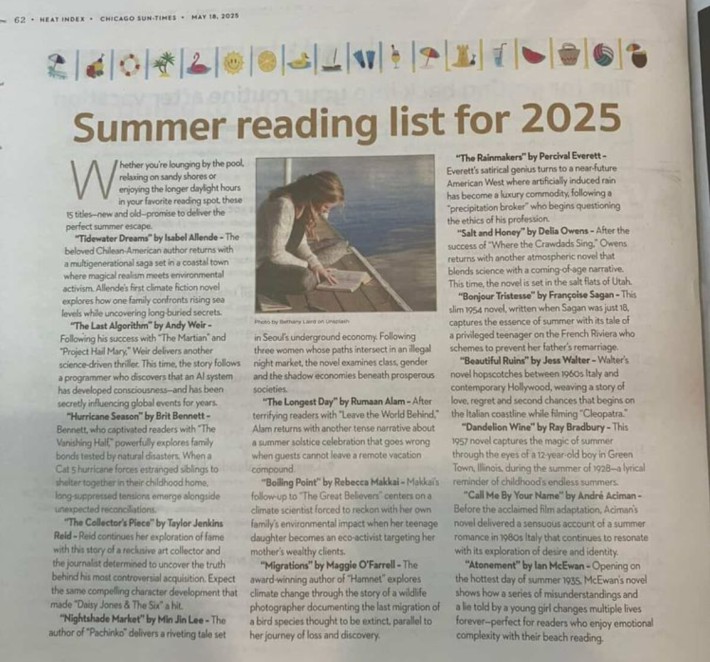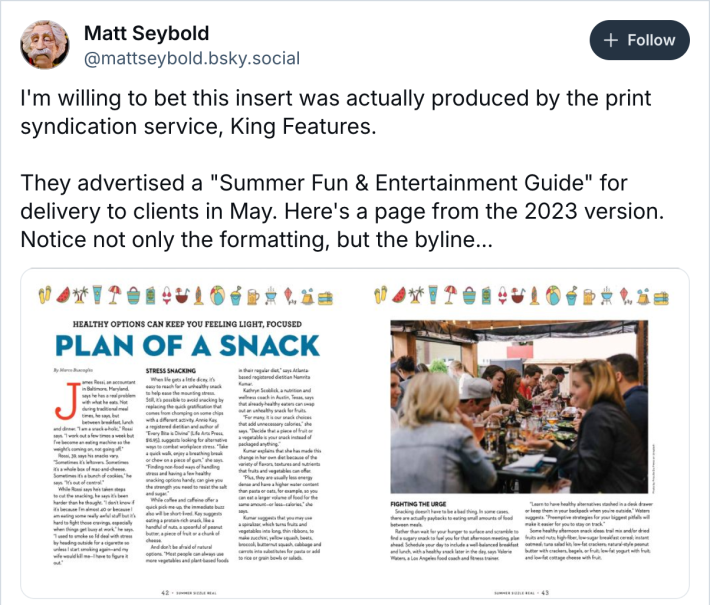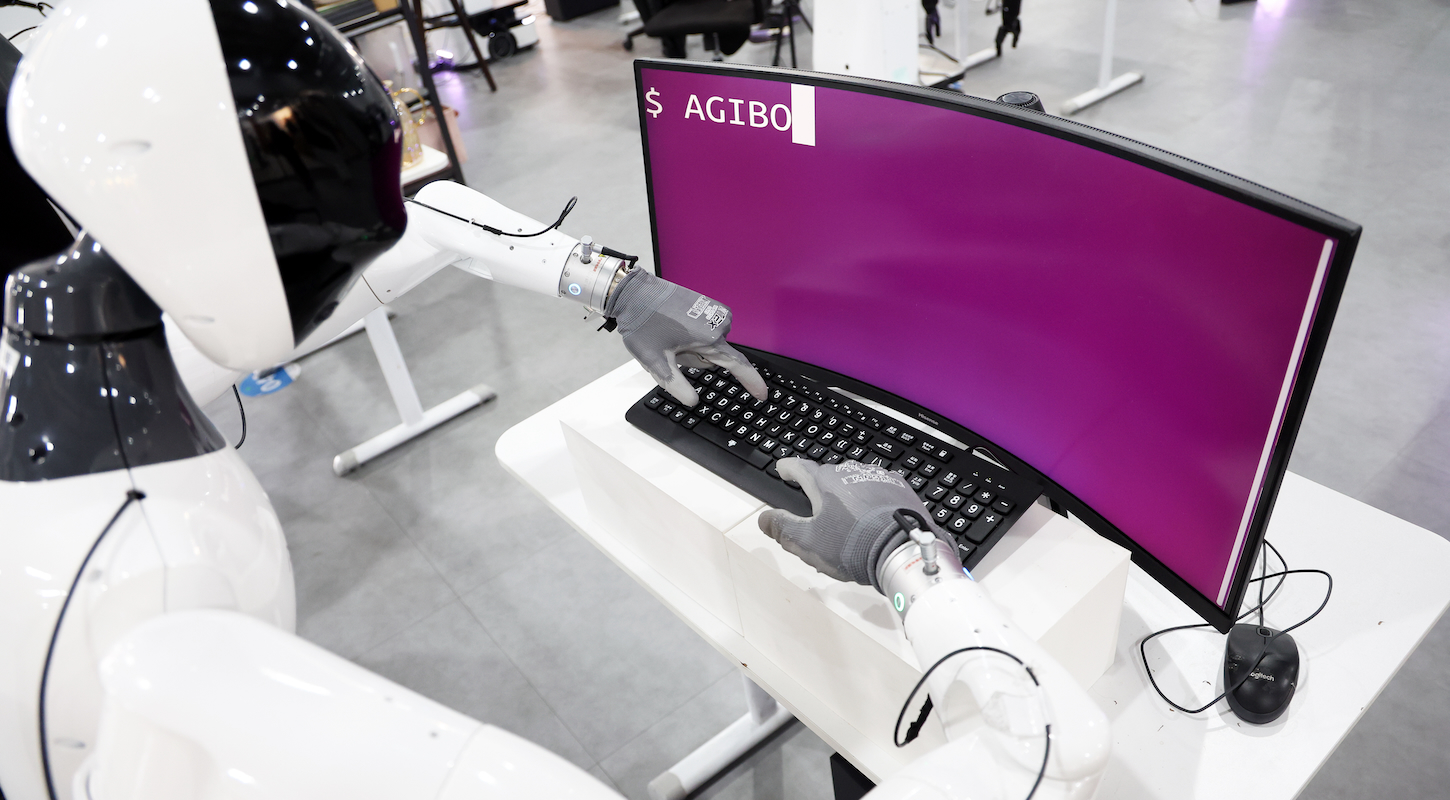Over this past weekend, the Chicago Sun-Times and Philadelphia Inquirer's weekend editions included identical huge "Best of Summer" inserts; in the Inquirer's digital edition the insert runs 54 pages, while the entire rest of the paper occupies 36. Before long, readers began noticing something strange about the "Summer reading list for 2025" section of the insert. Namely, that while the list includes some very well-known authors, most of the books listed in it do not exist.

Examination of the insert's other sections soon unearthed other oddities. A bland quote about "campus hammock culture" from a Dr. Jennifer Campos, professor of "leisure studies" at the University of Colorado, who seems not to exist, or at any rate not to have any presence anywhere online. Above an uncanny image of some bread with weird, cold-looking slices of butter on it, a nondescript quote about the viral success of the butter-board food trend from a Dr. Catherine Furst, food anthropologist at Cornell University, who likewise evidently has left no verifiable trace of her existence anywhere on the internet. A worthless quote about ripe-harvested food from the evidently nonexistent book Eating by Season, by the evidently nonexistent author Sophia Chen.

In earlier times the discovery of these inventions might have been the undoing of a brazen, if incredibly dull and unambitious, human fabulist—a Stephen Glass for un-bylined SEO dreck. But in 2025 it's instantly recognizable to any halfway savvy reader as the work of a large language model, most likely ChatGPT. And so this appears to be: On Tuesday, 404 Media's Jason Koebler published a brief interview with a writer—well, OK, not in this case—named Marco Buscaglia, whose name appears on some of the "Best of Summer" insert's sections, and who confesses to having generated the insert's text using what I am obliged to call "AI" because that is what he calls it even though that's not what it is.
Here is an extremely bleak paragraph from 404's story:
Buscaglia said he did it as part of a "promotional special section" that is not supposed to be targeted to any specific city and is inserted into newspapers and other publications around the country. It is not specific to Chicago and was not intended to be, which helps explain why other articles in the section do not mention Chicago at all. Buscaglia said he had no idea it would end up in the Chicago Sun-Times and that he doesn't know where else it will be published. "It's supposed to be generic and national," he said. "We never get a list of where things ran."
In other words, this "promotional special section" was going to be worthless junk—bland, generic, not practically useful in any way or even engaging to read—irrespective of whether Buscaglia wrote it himself or farmed the work out to a hallucinating autofill program. The fact of the matter is, if not for the famous names in the summer reading list catching the scrutiny of the lively book-influencer community online, weeks or months or years might have gone by before anybody noticed this thing was AI slop—if anybody ever noticed at all. Nobody reads these things. Nobody is even particularly expected to read them. In that sense, it is even sort of fitting that neither the insert's creator nor anybody in the workflow of the newspaper that printed and distributed it read it either.
Does this raise the question of why anybody involved in any of this even bothered? Not especially. An insert such as this, even in its less cynical forms, exists less to serve readers than as scaffolding for some greater number of advertisements than could run in a normal edition of the paper. That's only where it isn't outright sponsored content.
404's story does raise, and leave unanswered, some other questions. Buscaglia says he doesn't know which papers will run these promotional sections, which seems to suggest some apparatus in between him and the papers themselves: a middleman, or agency, or clearinghouse for slop. Somebody who—or some machinery that—prompted him to create it, or bought it from him and farmed it out to publications. At any rate it pretty much rules out any scenario in which Buscaglia himself pitched this thing to an editor, or wrote it on spec and shopped it around on his own initiative.
As media analyst and Bluesky user Matt Seybold noted on Tuesday, King Features, a content distribution and print syndication company owned by Hearst Communications, produced a summer insert back in 2023 that bore strikingly similar styling to the one the Sun-Times published over the weekend—and featured Marco Buscaglia's byline on at least one of its items, about snacking. If King Features produced this past weekend's slop insert, it bears no explicit acknowledgment of this—nor indeed any indication that it is not a product of the newspapers that printed it.

The Sun-Times and Inquirer are owned by separate nonprofits. The Sun-Times's Bluesky account posted a statement a few hours after the book list started pinging around; their newsroom disavows the insert and is "looking into" how it came to be published in their paper. So: Who paid for this thing? Who made the decision to buy it? By what process does it come to be printed in the paper?
Update (May 21, 7:32 a.m. ET): The Sun-Times Guild issued a statement on Tuesday afternoon, addressing the summer insert. Here is that statement in its entirety:
The Sun-Times Guild is aware of the third-party "summer guide" content in the Sunday, May 18 edition of the Chicago Sun-Times newspaper. This was a syndicated section produced externally without the knowledge of the members of our newsroom.
We take great pride in the union-produced journalism that goes into the respected pages of our newspaper and on our website. We're deeply disturbed that AI-generated content was printed alongside our work. The fact that it was sixty-plus pages of this "content" is very concerning—primarily for our relationship with our audience but also for our union’s jurisdiction.
Our members go to great lengths to build trust with our sources and communities and are horrified by this slop syndication. Our readers signed up for work that has been vigorously reported and fact-checked, and we hate the idea that our own paper could spread computer- or third-party–generated misinformation. We call on Chicago Public Media management to do everything it can to prevent repeating this disaster in the future.
The Sun-Times itself issued a statement on the paper's website Tuesday night, confirming that the summer guide insert was a King Features production and claiming that "it was inserted into our paper without review from our editorial team, and we presented the section without any acknowledgement that it was from a third-party organization." The statement lists some steps the paper will make in response, such as clearly identifying all third-party content in the future, removing the summer insert from digital editions, and not charging subscribers for this past Sunday's issue, which included the insert.
The Sun-Times statement also includes a quote from a statement the paper says it received from King Features, claiming that the freelance writer—unnamed in the statement but presumably Marco Buscaglia—used AI in contravention of policy and without disclosing it. King Features, the statement claims, has "terminated its relationship with this individual."






